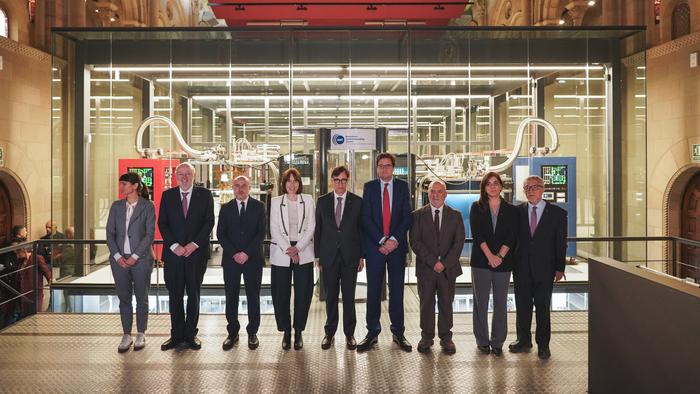The groundbreaking presentation of the first quantum computer developed entirely using European technology by the Barcelona Supercomputing Center (BSC-CNS) marks a transformative moment in the field of computing and scientific research in Spain. This innovative advance is not only a testament to the burgeoning capabilities in quantum computing but also reinforces BSC’s pivotal role in Europe’s supercomputing landscape. The unveiling of this quantum computer aligns with the growing need for enhanced computational power, capable of tackling complex problems that traditional computing cannot solve.
This quantum computer is a significant component of the broader initiative known as Quantum Spain, which aims to position Spain as a leader in the quantum and supercomputing domains. Coordinated by BSC and backed by the Ministry for Digital Transformation and Public Administration through the State Secretariat for Digitalisation and Artificial Intelligence (SEDIA), Quantum Spain benefits from funding within the framework of the Recovery, Transformation and Resilience Plan. The initiative also plays a crucial role in achieving the targets outlined in Spain’s Digital Spain 2026 programme and the National Artificial Intelligence Strategy (ENIA).
The collaborative nature of Quantum Spain involves a robust partnership between 27 leading research and supercomputing institutions spread across the country. This expansive network includes the 14 nodes of the Spanish Supercomputing Network (RES) and eminent institutions like the Spanish National Research Council (CSIC), the Institute of Photonic Sciences (ICFO), and prestigious universities such as the University of Barcelona, the Autonomous University of Madrid, and the Polytechnic University of Valencia. This collective effort ensures a comprehensive approach to harnessing quantum computing’s potential for scientific advancement.
At the heart of this quantum leap is the integration of the new quantum infrastructure into MareNostrum 5, touted as one of the most powerful supercomputers globally. The event, steeped in significance, took place in the historic Torre Girona chapel, a site synonymous with innovation as it housed the initial versions of MareNostrum. By integrating the quantum computer into MareNostrum 5, Spain is positioning itself at the forefront of computational technology, enabling unprecedented capabilities for researchers and industries alike.
The introduction of this digital quantum computer within a powerful supercomputing environment signals a remarkable boost to Spain’s computational infrastructure. As researchers and industries collaborate to exploit the strengths of both classical and quantum technologies, the drive for innovation will foster not only advances in science but also bolster the technological landscape, creating a wealth of highly skilled jobs.
Quantum computing holds transformative potential across various fields, including chemistry, logistics, and finance. The ability to process information using quantum bits, or qubits, allows scientists and researchers to explore atomic-level phenomena and solve intricate problems that were previously thought to be insurmountable. Moreover, this technology opens new pathways for the development of materials and the formulation of new medicines, pushing the boundaries of innovation.
The new system, which integrates superconducting qubits that can hold multiple states, represents a significant innovation in computational technology. Unlike traditional bits that obey binary constraints, qubits offer the potential to exponentially increase processing power, enabling computation at an entirely new scale. This leap forward does not merely enhance computational efficiency; it redefines the complexity that can be tackled within the realm of scientific inquiry.
In terms of technological independence, the construction of Quantum Spain’s quantum computer underscores a strategic commitment to bolster European capability and reduce reliance on infrastructures from other nations. This is particularly important in the context of the European Commission’s ongoing efforts to ensure technology sovereignty. Through the development of this quantum computer built entirely with European technology, Spain is actively contributing to reinforcing the continent’s position in the global technological arena.
The ramifications of this quantum computing initiative stretch well beyond theoretical applications. The combination of quantum technology with artificial intelligence promises to elevate machine learning algorithms to new heights of efficiency and effectiveness. This potent synergy could lead to groundbreaking advancements in data processing, security, and optimization methods across diverse industries.
As part of its multifaceted goals, Quantum Spain also emphasizes collaboration with the scientific community and public organizations. Access to the quantum computer will be facilitated through established mechanisms within the Spanish Supercomputing Network, ensuring that a broad spectrum of stakeholders can benefit from this advanced technology. Consequently, this initiative is anticipated to propel Spain further into the ranks of leaders in quantum research and supercomputing.
The construction of the quantum computer was realized through a joint venture involving Spanish companies Qilimanjaro and GMV, both recognized for their pioneering contributions to tech innovation. By leveraging their expertise in developing superconducting qubit systems, they have laid the groundwork for a computing architecture primed for tackling future challenges in quantum mechanics and computational science.
In closing, the launch of this quantum computer represents not just a standalone achievement, but a critical step in a larger narrative of scientific and technological progress within Spain and Europe. With strategic investments and collaborative efforts paving the way, the potential that quantum computing holds for varied industries and research domains is only beginning to be realized.
As this field continues to flourish, the implications for society, industry, and our understanding of complex systems will resonate far beyond the halls of research institutions. The integration of quantum computing into mainstream use heralds a new era of scientific exploration, innovation, and opportunity that could redefine the future of technology.
—
Subject of Research: Quantum Computing in Spain
Article Title: Spain’s Quantum Leap: Unveiling the First European Quantum Computer
News Publication Date: [Insert Date]
Web References: [Insert Links]
References: [Insert References]
Image Credits: Mario Ejarque (BSC)
Keywords: Quantum Computing, Supercomputing, Quantum Spain, BSC, MareNostrum, Technology Sovereignty, Artificial Intelligence, Computational Science, European Technology, Innovation.




